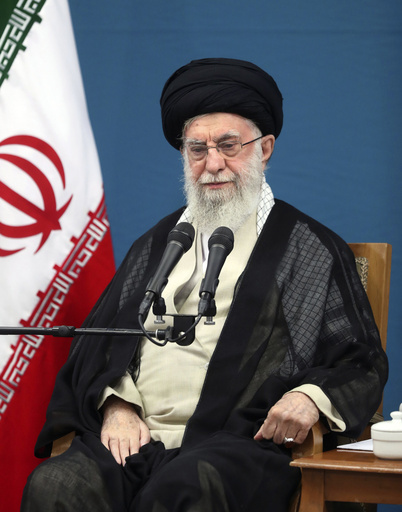In Dubai, Iran’s supreme leader expressed openness on Tuesday to potential negotiations with the United States concerning Iran’s advancing nuclear program. Ayatollah Ali Khamenei mentioned there was no harm in engaging with the enemy but cautioned against placing too much trust in the U.S. This statement from Khamenei outlined specific red lines for talks under President Masoud Pezeshkian’s government and highlighted lingering distrust toward Washington.
Despite Khamenei’s past ambivalence towards talks with the U.S. following President Donald Trump’s withdrawal from the 2018 nuclear deal, recent indirect discussions between Iran and the U.S. have taken place with mediation from Oman and Qatar. The U.S. State Department emphasized the importance of Iran demonstrating seriousness by ceasing nuclear escalations and cooperating with the International Atomic Energy Agency.
Since the collapse of the nuclear deal, Iran has exceeded the program’s limits, enriching uranium to levels nearing weapons-grade. Tensions between Iran and Israel have intensified during the Israel-Hamas conflict, with Iran launching attacks on Israel in response to perceived provocations. Pezeshkian’s government, which includes Foreign Minister Abbas Araghchi, who was a key figure in the 2015 negotiations, seems poised for potential engagement with the West.
Khamenei’s recent remarks about the possibility of a “tactical retreat” and the need to maintain goals amid difficulties suggest a shifting approach amid escalating pressures. Speculation surrounds the upcoming U.S. presidential election and its implications for diplomatic relations with Iran, particularly regarding Vice President Kamala Harris and former President Trump’s candidacies. A risk-intelligence firm suggested that a Harris presidency might increase the likelihood of a new deal with Iran but cautioned about Iran’s demands for better safeguards.
A recent meeting between Khamenei and Pezeshkian’s Cabinet included former Foreign Minister Mohammad Javad Zarif, who played a crucial role in the 2015 deal. Zarif, who had previously resigned over Cabinet appointments, confirmed he would serve as a vice president in Pezeshkian’s administration following the gathering. Discussions and developments between Iran and the U.S. remain crucial as both countries navigate challenges in the region and on the global stage.




